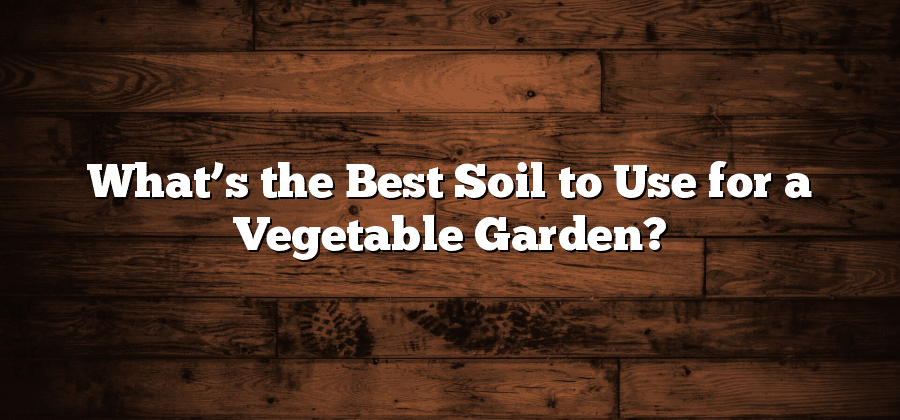Importance of Choosing Ideal Soil for Vegetable Gardens
The soil in which vegetables are grown plays a crucial role in their overall health and productivity. Choosing the ideal soil for your vegetable garden is of paramount importance for several reasons. Firstly, it provides a stable foundation for the plants, allowing them to establish strong root systems and absorb water and nutrients efficiently. Secondly, the right soil composition can help prevent common issues such as poor drainage or compaction, which can limit plant growth and yield. Lastly, suitable soil conditions can promote beneficial microbial activity, further enhancing the overall health and vigor of your vegetable garden.
When selecting soil for your vegetable garden, it is essential to consider several factors. The texture of the soil, including the proportions of sand, silt, and clay, influences its ability to retain water and nutrients. A soil with balanced texture ensures adequate moisture for plant roots while preventing excessive waterlogging. Additionally, the pH level of the soil should be conducive to vegetable growth, as different plants thrive in different pH ranges. Conduct a soil test to determine the pH level and make necessary amendments to create an optimal growing environment. By carefully choosing the ideal soil for your vegetable garden, you are setting a solid foundation for successful and bountiful harvests.
Understanding Nutrient Requirements for Vegetable Plants
Vegetable plants, like all living organisms, have specific nutrient requirements that are crucial for their growth and development. Understanding these requirements is essential for ensuring optimal yields and the overall health of your vegetable garden.
The three primary nutrients that vegetable plants require are nitrogen (N), phosphorus (P), and potassium (K). Nitrogen is responsible for promoting leafy growth and vibrant green foliage. Phosphorus plays a vital role in root development and flowering, while potassium aids in overall plant health and disease resistance. Each nutrient plays a unique and important role in the growth cycle of vegetable plants, and it is important to provide them in the right proportion to support healthy growth. Understanding the specific needs of your vegetable plants will help you choose the right fertilizers and amendments to meet these requirements, promoting robust and fruitful harvests.
Evaluating Soil Composition for Maximum Vegetable Growth
Soil composition plays a crucial role in ensuring optimal vegetable growth and productivity. Understanding the composition of soil can help gardeners make informed choices to create the perfect environment for their vegetable plants.
One important aspect to evaluate is the pH level of the soil. Most vegetables thrive in slightly acidic to neutral pH levels, around 6.0 to 7.0. By testing the soil’s pH, gardeners can determine if any adjustments need to be made to ensure the ideal conditions for their vegetable plants. This can be achieved by adding materials such as lime to raise the pH or sulfur to lower it. Assessing the pH level is a fundamental step in achieving maximum vegetable growth.
Another aspect to consider is the soil’s texture or structure. Vegetable plants require well-draining soil to avoid issues such as waterlogging, which can lead to root rot and hinder plant growth. Sandy soil, for example, drains quickly and may not retain enough moisture for the plants. On the other hand, clay soil holds onto water for longer periods, increasing the risk of overwatering. Gardeners can evaluate their soil’s texture by conducting a simple squeeze test. By gathering a handful of soil and squeezing it, they can assess whether it feels sandy, loamy, or clay-like. This information can guide gardeners in making soil amendments to improve drainage or water-holding capacity, ensuring that their vegetable plants have an optimal growth environment.
Exploring Different Soil Types for Vegetable Gardens
The success of a vegetable garden relies heavily on the quality of the soil it is grown in. Different soil types can have a profound impact on the overall health and growth of vegetable plants. By exploring various soil types, gardeners can identify the most suitable option for their vegetable garden.
One common type of soil used in vegetable gardens is loam soil. Loam soil is a combination of sand, silt, and clay, which provides a well-balanced mixture of drainage and water retention. This type of soil allows for optimal root development and nutrient absorption, resulting in healthy and robust vegetable plants. Other soil types, such as sandy soil and clay soil, have their own characteristics and considerations that gardeners should take into account when deciding which is best suited for their vegetable garden.
The choice of soil type is crucial in determining the success of vegetable gardens. Gardeners should carefully evaluate the different soil types available to them and consider factors such as water drainage, water retention, and nutrient content. By choosing the right soil type for their vegetable garden, gardeners can create an environment that promotes optimal growth and ensures a bountiful harvest.
Organic Soil Amendments for Nutrient-rich Soil
One of the key factors in creating a thriving vegetable garden is having nutrient-rich soil. Organic soil amendments can play a crucial role in providing the necessary nutrients for healthy plant growth. These amendments, which are derived from natural sources, can help improve soil fertility, increase organic matter content, and enhance the overall nutrient availability for your vegetable plants.
One commonly used organic soil amendment is compost. Compost is the result of decomposed organic materials such as leaves, grass clippings, and kitchen scraps. Adding compost to your soil can enhance its structure, drainage, and water-holding capacity. Additionally, compost is rich in essential nutrients that are slowly released to the plants, supporting their growth and development. Another popular option is aged manure, which not only adds nutrients to the soil but also improves its structure and moisture retention. Whether you choose compost, aged manure, or other organic soil amendments, incorporating them into your garden beds can significantly contribute to the health and productivity of your vegetable plants.






